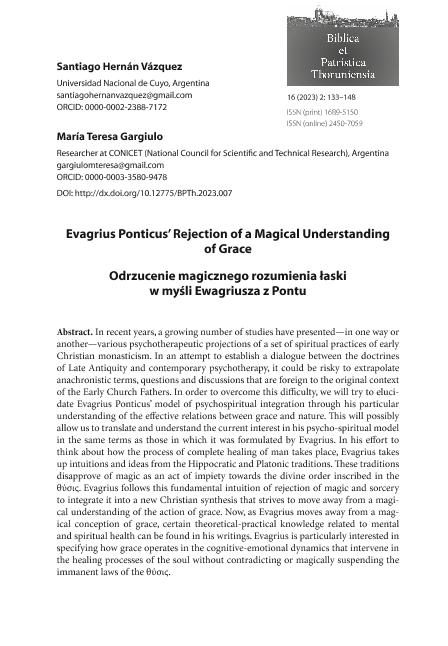Artículo
In recent years, a growing number of studies have presented - in one way or another - various psychotherapeutic projections of a set of spiritual practices of early Christian monasticism. In an attempt to establish a dialogue between the doctrines of Late Antiquity and contemporary psychotherapy, it could be risky to extrapolate anachronistic terms, questions and discussions that are foreign to the original context of the Early Church Fathers. In order to overcome this difficulty, we will try to elucidate Evagrius Ponticus' model of psychospiritual integration through his particular understanding of the effective relations between grace and nature. This will possibly allow us to translate and understand the current interest in his psycho-spiritual model in the same terms as those in which it was formulated by Evagrius. In his effort to think about how the process of complete healing of man takes place, Evagrius takes up intuitions and ideas from the Hippocratic and Platonic traditions. These traditions disapprove of magic as an act of impiety towards the divine order inscribed in the {greek word presented}. Evagrius follows this fundamental intuition of rejection of magic and sorcery to integrate it into a new Christian synthesis that strives to move away from a magical understanding of the action of grace. Now, as Evagrius moves away from a magical conception of grace, certain theoretical-practical knowledge related to mental and spiritual health can be found in his writings. Evagrius is particularly interested in specifying how grace operates in the cognitive-emotional dynamics that intervene in the healing processes of the soul without contradicting or magically suspending the immanent laws of the {greek word presented}. W ostatnich latach pojawiają się coraz liczniejsze badania, które w taki czy inny sposób przedstawiają różne projekcje psychoterapeutyczne zbioru praktyk duchowych wywodzących się z wczesnochrześcijańskiego monastycyzmu. Należy jednak pamiętać, że próby nawiązania dialogu pomiędzy doktrynami z późnego okresu antycznego a współczesną psychoterapią niosą ze sobą ryzyko związane z ekstrapolacją anachronicznych terminów, pytań i dyskusji, które są obce pierwotnemu kontekstowi Ojców wczesnego Kościoła. Aby przezwyciężyć tę trudność, postaramy się objaśnić model integracji psychiczno-duchowej Ewagriusza z Pontu w oparciu o jego szczególne rozumienie efektywnych relacji między naturą a łaską. Być może pozwoli nam to również przełożyć i zrozumieć obecne zainteresowanie powyższym modelem w tych samych kategoriach, w których sformułował go sam Ewagriusz. W swoich rozważaniach nad tym, jak przebiega proces całkowitego uzdrowienia człowieka, Ewagriusz czerpie z intuicji i idei wywodzących się z tradycji Hipokratesa i Platona. Tradycje te potępiają magię jako akt bezbożności wobec boskiego porządku wpisanego w θύσις. Ewagriusz kieruje się tą fundamentalną intuicją odrzucenia magii i czarów, aby zintegrować swój model z nową chrześcijańską syntezą, w której stara się odejść od magicznego rozumienia działania łaski. W miarę odchodzenia od magicznej koncepcji łaski w pismach Ewagriusza pojawiają się elementy wiedzy praktyczno-teoretycznej dotyczącej zdrowia psychicznego i duchowego. Szczególnie interesuje go określenie, w jaki sposób łaska działa w dynamice poznawczo-emocjonalnej będącej elementem procesów uzdrawiania duszy bez zaprzeczania immanentnym prawom θύσις lub ich magicznego zawieszania.
Evagrius Ponticus' Rejection of a Magical Understanding of Grace
Título:
Odrzucenie magicznego rozumienia laski w mysli Ewagriusza z Pontu
Fecha de publicación:
07/2023
Editorial:
Universidad Nicolaus Copernicus. Facultad de Teología
Revista:
Biblica et Patristica Thoruniensia
ISSN:
1689-5150
e-ISSN:
2450-7059
Idioma:
Inglés
Tipo de recurso:
Artículo publicado
Clasificación temática:
Resumen
Palabras clave:
ENCHANTMENT
,
EVAGRIUS PONTICUS
,
GRACE
,
HIPPOCRATES
,
MAGIC
,
NATURE
,
PLATO
Archivos asociados
Licencia
Identificadores
Colecciones
Articulos(CCT - MENDOZA)
Articulos de CTRO.CIENTIFICO TECNOL.CONICET - MENDOZA
Articulos de CTRO.CIENTIFICO TECNOL.CONICET - MENDOZA
Citación
Vazquez, Santiago Hernán; Gargiulo, María Teresa; Evagrius Ponticus' Rejection of a Magical Understanding of Grace; Universidad Nicolaus Copernicus. Facultad de Teología; Biblica et Patristica Thoruniensia; 16; 2; 7-2023; 133-148
Compartir
Altmétricas




